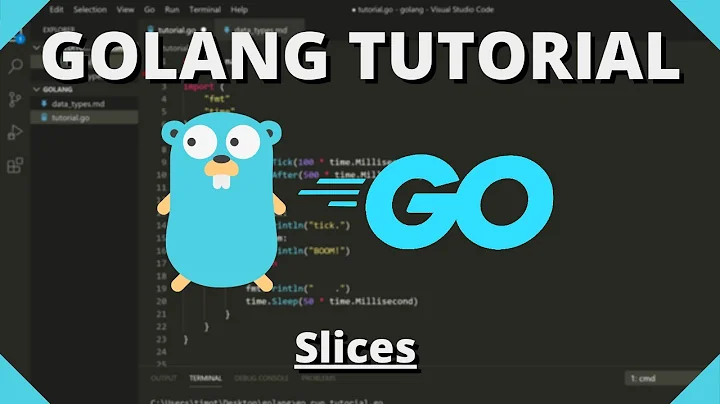Split string by length in Golang
Solution 1
Make sure to convert your string into a slice of rune: see "Slice string into letters".
for automatically converts string to rune so there is no additional code needed in this case to convert the string to rune first.
for i, r := range s {
fmt.Printf("i%d r %c\n", i, r)
// every 3 i, do something
}
r[n:n+3] will work best with a being a slice of rune.
The index will increase by one every rune, while it might increase by more than one for every byte in a slice of string: "世界": i would be 0 and 3: a character (rune) can be formed of multiple bytes.
For instance, consider s := "世a界世bcd界efg世": 12 runes. (see play.golang.org)
If you try to parse it byte by byte, you will miss (in a naive split every 3 chars implementation) some of the "index modulo 3" (equals to 2, 5, 8 and 11), because the index will increase past those values:
for i, r := range s {
res = res + string(r)
fmt.Printf("i %d r %c\n", i, r)
if i > 0 && (i+1)%3 == 0 {
fmt.Printf("=>(%d) '%v'\n", i, res)
res = ""
}
}
The output:
i 0 r 世
i 3 r a <== miss i==2
i 4 r 界
i 7 r 世 <== miss i==5
i 10 r b <== miss i==8
i 11 r c ===============> would print '世a界世bc', not exactly '3 chars'!
i 12 r d
i 13 r 界
i 16 r e <== miss i==14
i 17 r f ===============> would print 'd界ef'
i 18 r g
i 19 r 世 <== miss the rest of the string
But if you were to iterate on runes (a := []rune(s)), you would get what you expect, as the index would increase one rune at a time, making it easy to aggregate exactly 3 characters:
for i, r := range a {
res = res + string(r)
fmt.Printf("i%d r %c\n", i, r)
if i > 0 && (i+1)%3 == 0 {
fmt.Printf("=>(%d) '%v'\n", i, res)
res = ""
}
}
Output:
i 0 r 世
i 1 r a
i 2 r 界 ===============> would print '世a界'
i 3 r 世
i 4 r b
i 5 r c ===============> would print '世bc'
i 6 r d
i 7 r 界
i 8 r e ===============> would print 'd界e'
i 9 r f
i10 r g
i11 r 世 ===============> would print 'fg世'
Solution 2
Here is another variant playground. It is by far more efficient in terms of both speed and memory than other answers. If you want to run benchmarks here they are benchmarks. In general it is 5 times faster than the previous version that was a fastest answer anyway.
func Chunks(s string, chunkSize int) []string {
if len(s) == 0 {
return nil
}
if chunkSize >= len(s) {
return []string{s}
}
var chunks []string = make([]string, 0, (len(s)-1)/chunkSize+1)
currentLen := 0
currentStart := 0
for i := range s {
if currentLen == chunkSize {
chunks = append(chunks, s[currentStart:i])
currentLen = 0
currentStart = i
}
currentLen++
}
chunks = append(chunks, s[currentStart:])
return chunks
}
Please note that the index points to a first byte of a rune on iterating over a string. The rune takes from 1 to 4 bytes. Slicing also treats the string as a byte array.
PREVIOUS SLOWER ALGORITHM
The code is here playground. The conversion from bytes to runes and then to bytes again takes a lot of time actually. So better use the fast algorithm at the top of the answer.
func ChunksSlower(s string, chunkSize int) []string {
if chunkSize >= len(s) {
return []string{s}
}
var chunks []string
chunk := make([]rune, chunkSize)
len := 0
for _, r := range s {
chunk[len] = r
len++
if len == chunkSize {
chunks = append(chunks, string(chunk))
len = 0
}
}
if len > 0 {
chunks = append(chunks, string(chunk[:len]))
}
return chunks
}
Please note that these two algorithms treat invalid UTF-8 characters in a different way. First one processes them as is when second one replaces them by utf8.RuneError symbol ('\uFFFD') that has following hexadecimal representation in UTF-8: efbfbd.
Solution 3
Also needed a function to do this recently, see example usage here
func SplitSubN(s string, n int) []string {
sub := ""
subs := []string{}
runes := bytes.Runes([]byte(s))
l := len(runes)
for i, r := range runes {
sub = sub + string(r)
if (i + 1) % n == 0 {
subs = append(subs, sub)
sub = ""
} else if (i + 1) == l {
subs = append(subs, sub)
}
}
return subs
}
Solution 4
Here is another example (you can try it here):
package main
import (
"fmt"
"strings"
)
func ChunkString(s string, chunkSize int) []string {
var chunks []string
runes := []rune(s)
if len(runes) == 0 {
return []string{s}
}
for i := 0; i < len(runes); i += chunkSize {
nn := i + chunkSize
if nn > len(runes) {
nn = len(runes)
}
chunks = append(chunks, string(runes[i:nn]))
}
return chunks
}
func main() {
fmt.Println(ChunkString("helloworld", 3))
fmt.Println(strings.Join(ChunkString("helloworld", 3), "\n"))
}
Solution 5
An easy solution using regex
re := regexp.MustCompile((\S{3}))
x := re.FindAllStringSubmatch("HelloWorld", -1)
fmt.Println(x)
Related videos on Youtube
Fernando Parra
Updated on October 01, 2021Comments
-
Fernando Parra over 2 years
Does anyone know how to split a string in Golang by length?
For example to split "helloworld" after every 3 characters, so it should ideally return an array of "hel" "low" "orl" "d"?
Alternatively a possible solution would be to also append a newline after every 3 characters..
All ideas are greatly appreciated!
-
Volker over 9 yearsWell, some programming might help here? Like
s[n:n+3]+"\n"?
-
-
rahul over 6 yearsDidi u run it in The Go Playground? Could you pls let me know wht u didnt understand?
-
PLG almost 6 yearsshould be
FindAllStringinstead ofFindAllStringSubmatch, no? -
Igor Mikushkin about 4 yearsThis is by far the best answer here. However
len(runes)check looks unnecessary. You can checklen(s)and return nil or empty array. This way you can definerunesandchunksafter this check -
 VonC about 4 yearsInteresting. Upvoted. Certainly more effective than my 6 years old answer!
VonC about 4 yearsInteresting. Upvoted. Certainly more effective than my 6 years old answer! -
Igor Mikushkin about 4 yearsIt is very ineffective because of string concatenations. There are answers that don't use them
-
Igor Mikushkin about 4 yearsIt is very ineffective because of string concatenations. There are answers that don't use them
-
Igor Mikushkin about 4 yearsActually I wrote my own answer now that is more effective
-
 TomOnTime almost 4 yearsThis should be added to the standard library.
TomOnTime almost 4 yearsThis should be added to the standard library. -
ardnew almost 3 yearsYou can improve performance over this by using
strings.Builder, see this playground. Benchmarks here -
Igor Mikushkin almost 3 years@ardnew Thanks a lot for pointing it out! It shows that copying is a performance hit. However this builder does some copying by itself and it is not needed here. Instead I came up with even faster version that I will post here soon
-
Mark Robson almost 3 yearsthis is by far the best example. Judging by the number of upvotes it has, it seems go programmers like to write lots of code!
-
leonardo over 2 yearsover-engineering, this is a simple problem.
-
 Junru Zhu over 2 yearsthis losts the last item. DON'T USE.
Junru Zhu over 2 yearsthis losts the last item. DON'T USE.






![Strings and Runes in Go [Go for Beginners #5]](https://i.ytimg.com/vi/XKyFc2fZuIg/hq720.jpg?sqp=-oaymwEcCNAFEJQDSFXyq4qpAw4IARUAAIhCGAFwAcABBg==&rs=AOn4CLB-S5OojZoIe-jcv4lYFszNzDQNSA)

